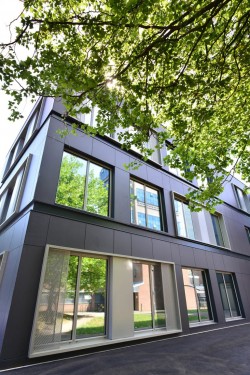The Modular & Portable Building Association (MPBA) has publicly supported the government’s transformative 10-year school rebuilding programme backed by over £1bn in funding.
Representing the first major school rebuilding programme to be launched since 2014, schools will benefit from substantial additional investment. The rebuilding programme will start in 2020-21 with the first 50 projects. These new education projects will be greener, helping meet the government’s net-zero target, and will focus on modern construction methods – volumetric modular technology will play a major part in the delivery strategy.
This initiative comes on the back of the Department for Education’s (DfE) announcement in January 2020 revealing the offsite schools framework “to cultivate innovation and modernise the industry by increasing the adoption of Modern Methods of Construction”. The DfE programme will deliver some 30 offsite schools a year with a projected pipeline of up to £3bn over the next four years.
MPBA chief executive Jackie Maginnis said: “As the construction industry starts to emerge from this pandemic, it’s important we lay the foundations for a more rapid and sustainable schools building programme, where the focus is on quality and delivering education facilities that are fit for the future. The use of offsite modular technology will help meet the government’s net-zero target.
“We are pleased that some of our members have been appointed to bring their expertise in volumetric modular technology to the fore within the offsite schools framework, which will help to deliver high-quality education facilities as swiftly as possible.
“Many are concerned about the impact Covid-19 will have on education, it is therefore even more crucially important that school building programmes get back on track as soon as possible to ensure teachers and students have the best possible environments as they make up for lost time.”
Offsite technology offers benefits that have had a huge positive impact on the construction industry, bringing longstanding traditional practices up to date. The first key shift away from traditional methods is that build processes take place in controlled factory conditions, which requires a change of mind-set and approach.
With students becoming more conscious of climate change, introducing the concept of sustainable volumetric construction approaches will be beneficial. The modular way limits the amount of concrete, which is a significant issue for traditional builders. Eco-friendly materials are often specified and each individual component can be selected specifically for its performance characteristics, tailoring every inch of a modular build. There is also minimal waste, as the classrooms are built to exacting designed specifications and any cut-offs can be reused or recycled – reducing waste to landfill.
To discover how modular building can benefit education construction plans go to: www.mpba.biz
For more Offsite construction information and to hear the latest developments within the Offsite technology sector join our Explore Offsite LinkedIn Group
sourced: www.pbctoday.co.uk









